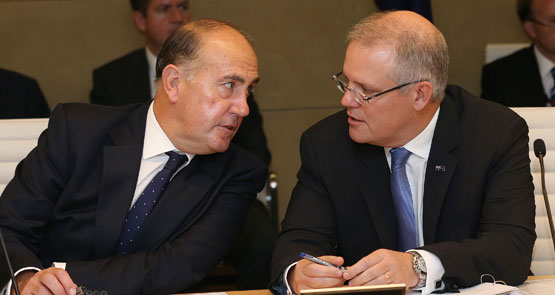
Treasury secretary John Fraser delivered an address to the Sydney Institute last night, warning that government spending was too high and tough measures would need to be taken to avoid compromising the living standards of future generations. In a speech widely seen to be a precursor to the federal budget in May, he said that, despite this, “we are not in a crisis” and that Australia has a strong fiscal position by world standards.
However, net debt is approaching levels not seen since the recession of the early 1990s, which, at that time, was the highest since World War II, Fraser said. “We are yet to return to pre-GFC net debt levels.”
Australia has a structural budget problem that arose before the GFC, he said. “The recent weakness in revenue is only partly to blame. From the outset of the commodity price boom of the early 2000s, government revenue grew faster than expected as the terms of trade persistently exceeded expectations.”
“But structural expenditure decisions offset much of the temporary revenue gain,” he said, adding that much of the revenue windfall was used to fund long-term spending commitments.
As a result of this, spending in 2015-16 is forecast to be 25.9% of GDP, which is close to the post-GFC peak, he says. This is mainly due to increased spending in the areas of aged care, disability care and assistance for the unemployed and the sick.
One of the biggest drivers of increased spending is the aging of the population, an issue “I am sadly reminded of every time I look in the mirror in the morning,” the 64-year-old said. This affects health and welfare spending, he added.
Other areas of increased spending include defence and border protection, expenditure relating to the carbon compensation package and the outcomes of negotiations around the repeal of the Minerals Resource Rent Tax. The government has forecast that spending will decline to 25.3% of GDP by 2018-19.
On top of this, Commonwealth interest payments have also risen sharply despite the current low interest-rate environment; they have now reached over $1 billion a month. “This is projected to more than double within the decade, unless action is taken to improve our budgetary position,” he said.
Fraser said that the government’s medium-term fiscal strategy included achieving budget surpluses, on average, over the course of the economic cycle, saying that “this will take time”. In the longer term, Commonwealth surpluses would enable the states to run small overall deficits that they could use to finance productive infrastructure development.
However, he said that the Commonwealth government will receive around $39 billion less in tax receipts in 2016-17 than it had predicted in 2013. This was largely attributable to less income tax being collected due to lower-than-expected working-age population growth and weaker wages growth, as well as declines in commodity prices and weaker equity markets.
Fraser said that recent cuts to welfare payments were not unfair. “After taking into account the low level of tax paid by those on lower incomes, Australia redistributes more to the poorest 20% of the population than any other OECD country except Denmark.”
After leaving Treasury in the early 1990s, Fraser spent 22 years in London, working at the highest levels of global finance. Last night, he said that he had established Treasury offices in Sydney and Melbourne because he wanted to have “a great deal” more interaction with the private sector. When running the asset-management arm of global banking giant UBS in London in the 1990s, the best forecaster in the company was a woman who eschewed strict economic modelling in favour of personal conversations, he said. He was also in the process of hiring young, enthusiastic economists for two- or three-year stints at Treasury, rather than for life. “These are people who see us as part of their career,” he said.
In conclusion, he said that tax reform was very firmly on the current government’s agenda. “Tax is not just about raising revenue, it is also about helping to shape the economy so that we attract and deploy resources in a manner to deploy long term growth.” However, he declined to answer questions about the GST and the increasing cost of border protection, saying that these were political issues.
However, one of the greatest obstacles to tax reform, poor Commonwealth-state relations, was now lessening, he said.
“The co-operation between the Commonwealth and the states is far better than I remember it 30 years ago.”
But the issue of inter-generational equity is very much on his mind.
In an interview with The Australian Financial Review last year he said:
“We do have great good fortune in Australia. Everybody is happy, and God bless us. I feel it here, in Canberra in particular, where everybody is deliriously happy and comfortable. But I do worry a little bit that we don’t realise how fortunate we are and that good fortune will only continue for our grandchildren if we face up to a few issues.”








No mention of multi-nationals paying almost no tax.
Nor of the regressive nature of superannuation concessions.
Fraser’s every pronouncement shows him to be unfit to manage a jar of threepenny bits. The neo liberal stupidity burns brightly in Fraser with brilliant insights that you have to cut spending in a consumer economy to achieve growth and worrying about intergenerational equity whatever that is.
For once I would like an economist to talk about Australia being in a downturn in the business cycle and that we need to run deficits to maintain jobs.
Clear example of Morrison heavying his public servants, rather than (a) allowing, and then (b) taking their advice. Thus, nothing Fraser says has any value, particularly since Morrison has no clue.
This is just leading up to a re-issue of the 2014 budget, except that since Morrison (unlike Hockey) has always looked, spoken and acted like a demented psychopath it will probably be worse.
This would of course be an appropriate time for the Crikey Commissariat to give enthusiastic support for the carefully selected areas in which Government spending should be cut; but that might affect its own revenues, so as a good Capitalist Enterprise, it’s not going to do that, is it.
A good capitalist enterprise would have hung on to, and fine tuned, its revenues like the carbon ‘tax’ and the mining tax.